Abstract
This qualitative study examined religion and spirituality among couples in which one person (a Catholic) believed in God and the other (e.g., an atheist, an agnostic) did not. Specifically, this study explored how the relationship impacted each individual’s beliefs about the existence of God and the extent to which the couples incorporated religious or spiritual elements into their relationship. Some of the nonbelievers became more open to the possibility of God’s existence, whereas others remained unchanged. Some believers reported that their faith was actually strengthened through the relationship. Couples incorporated religious elements into their relationship (e.g., having a religious wedding, attending church together) to varying degrees. A typology of the couples based on spiritual engagement and the nonbeliever’s openness to God emerged from the findings. Pastoral or clinical implications for working with such couples are discussed.

Similar content being viewed by others
References
Bahr, H. M. (1981). Religious intermarriage and divorce in Utah and the Mountain States. Journal for the Scientific Study of Religion, 20, 251–261.
Brewster, M. E., Robinson, M. A., Sandil, R., Esposito, J., & Geiger, E. (2014). Arrantly absent: Atheism in psychological science from 2001 to 2012. The Counseling Psychologist, 42, 628–663. https://doi.org/10.1177/0011000014528051.
Center for Marriage and Family. (1999). Marriage preparation in the Catholic Church: Getting it right. Creighton University.
Corbin, J., & Strauss, A. (2015). Basics of qualitative research: Techniques and procedures for developing grounded theory. (4th ed.). Sage.
David, P., & Stafford, L. (2015). A relational approach to religion and spirituality in marriage: The role of couples’ religious communication in marital satisfaction. Journal of Family Issues, 36, 232–249. https://doi.org/10.1177/0192513X13485922.
Ecklund, E. H., & Lee, K. S. (2011). Atheists and agnostics negotiate religion and family. Journal for the Scientific Study of Religion, 50, 728–743.
Ellison, C. G., Burdette, A. M., & Wilcox, W. B. (2010). The couple that prays together: Race and ethnicity, religion, and relationship quality among working-age adults. Journal of Marriage and Family, 72, 963–975. https://doi.org/10.1111/j.1741-3737.2010.00742.x.
Ellison, C. G., Henderson, A. K., Glenn, N. D., & Harkrider, K. E. (2011). Sanctification, stress, and marital quality. Family Relations, 60, 404–420. https://doi.org/10.1111/j.1741-3729.2011.00658.x.
Heller, P. E., & Wood, B. (2000). The influence of religious and ethnic differences on marital intimacy: Intermarriage versus intramarriage. Journal of Marital and Family Therapy, 26, 241–252.
Hernandez, K. M., Mahoney, A., & Pargament, K. I. (2011). Sanctification of sexuality: Implications for newlyweds’ marital and sexual quality. Journal of Family Psychology, 25, 775–780. https://doi.org/10.1037/a0025103.
Kusner, K., Mahoney, A., Pargament, K. I., & DeMaris, A. (2014). Sanctification of marriage and spiritual intimacy predicting observed interactions across the transition to parenthood. Journal of Family Psychology, 28, 606–614.
Lehrer, E. L., & Chiswick, C. (1993). Religion as a determinant of marital stability. Demography, 30, 385–404.
Lichter, D. T., & Carmalt, J. H. (2009). Religion and marital quality among low-income couples. Social Science Research, 38, 168–187. https://doi.org/10.1016/j.ssrearch.2008.07.003.
Loveland, M. T. (2003). Religious switching: Preference development, maintenance, and change. Journal for the Scientific Study of Religion, 42, 147–157.
Mahoney, A., Pargament, K. I., Jewell, T., Swank, A. B., Scott, E., Emery, E., & Rye, M. (1999). Marriage and the spiritual realm: The role of proximal and distal religious constructs in marital functioning. Journal of Family Psychology, 13, 321–338.
Maslim, A. A., & Bjorck, J. P. (2009). Reasons for conversion to Islam among women in the United States. Psychology of Religion and Spirituality, 2, 97–111. https://doi.org/10.1037/a0015735.
Myers, S. M. (2006). Religious homogamy and marital quality: Historical and generational patterns, 1980–1997. Journal of Marriage and Family, 68, 292–304.
Olson, J. R., Marshall, J. P., Goddard, H. W., & Schramm, D. G. (2015). Shared religious beliefs, prayer, and forgiveness as predictors of marital satisfaction. Family Relations, 64, 519–533. https://doi.org/10.1111/fare.12129.
Petts, R. J., & Knoester, C. (2007). Parent’s religious heterogamy and children’s well-being. Journal for the Scientific Study of Religion, 46, 373–389.
Pew Research Center (2015). America’s changing religious landscape. Author.
Roof, W. C. (1989). Multiple religious switching: A research note. Journal for the Scientific Study of Religion, 28, 530–535.
Sandelowski, M. (2000). Whatever happened to qualitative description? Research in Nursing & Health, 23, 334–340.
Schramm, D. G., Marshall, J. P., Harris, V. W., & Lee, T. R. (2012). Religiosity, homogamy, and marital adjustment. Journal of Family Issues, 33, 246–268.
Shalev, O., Baum, N., & Itzhaky, H. (2016). Religious identity in transition: Processes of change in the religious identity of young religious Jewish Newlyweds in Israel. The Family Journal, 24, 132–139. https://doi.org/10.1177/1066480716628598.
Stafford, L., David, P., & McPherson, S. (2014). Sanctity of marriage and marital quality. Journal of Social and Personal Relationships, 31, 54–70.
Streib, H., & Klein, C. (2013). Atheists, agnostics, and apostates. In K. I. Pargament (Ed.), APA handbook of psychology, religion, and spirituality: Vol. 1. Context, theory, and research. (pp. 713–728). American Psychological Association.
Vaaler, M. L., Ellison, C. G., & Powers, D. A. (2009). Religious influences on the risk of marital dissolution. Journal of Marriage and Family, 71, 917–934.
Zuckerman, P., Galen, L. W., & Pasquale, F. L. (2016). The nonreligious: understanding secular people and societies. Oxford University Press.
Author information
Authors and Affiliations
Corresponding author
Additional information
Publisher's Note
Springer Nature remains neutral with regard to jurisdictional claims in published maps and institutional affiliations.
The research reported in this study was approved by the Institutional Review Board at the University of San Diego.
Rights and permissions
About this article
Cite this article
Williams, L.M. Unequally Yoked? Religion and Spirituality in Couples in Which One Believes in God and the Other Does Not . Pastoral Psychol 70, 225–238 (2021). https://doi.org/10.1007/s11089-021-00948-3
Accepted:
Published:
Issue Date:
DOI: https://doi.org/10.1007/s11089-021-00948-3




